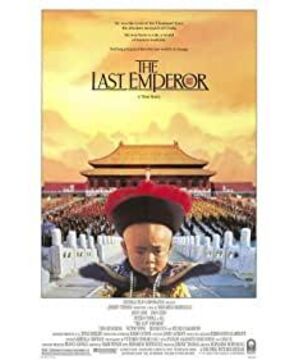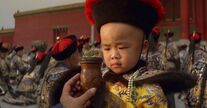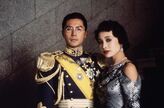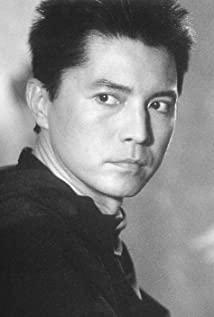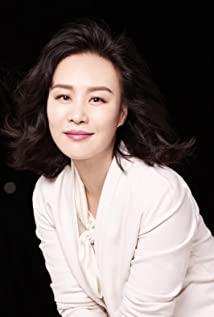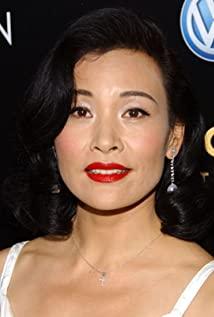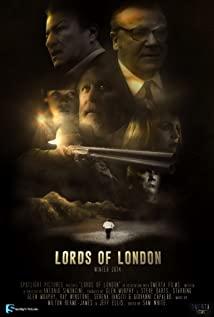There is a saying in the West: People cannot change their birth, but they can change their destiny. The last emperor, Pu Yi, spent his life trying to control his own destiny, but failed again and again. Since he was born into the royal family, it was doomed that his life could not be an ordinary life, and at the end of the Chinese feudal dynasty, his life was determined to be ill-fated. In the early 20th century, the general understanding of Chinese society was that the corruption and incompetence of the feudal dynasties caused China to cede territory and seek peace, losing power and humiliating the country. The Qing Dynasty was already considered to be the biggest source of China's backwardness, and social revolution was inevitable. In such an environment, Puyi hastily succeeded to the throne. At his age, he was still unable to manage politics, let alone beg him to actually solve social conflicts. The wind was surging outside the palace wall, and the little emperor inside the palace wall was completely ignorant and still spent his childhood peacefully. As soon as the little emperor was sensible, he realized that he was no longer the master of the whole of China, and he couldn't decide everything in the Forbidden City. From the very beginning, he was instilled by the traditional Chinese concept of being the monarch of a country, but when he really wanted to exercise the rights of a monarch, he found that he didn't even have the right to freedom. This contradiction struck Puyi deeply. A monarch who wants to do something but can't, a monarch who tries to regain control of his own destiny, a Puyi who is eager to go home and lead a normal life, the director of "The Last Emperor" restores to us a human Puyi and his extraordinary life.
Puyi appeared as a prisoner of war. He wore the same ordinary clothes as other prisoners of war, and he had no special actions. This way of appearing is very different from the dramatic appearance of the protagonist in traditional Western movies. Puyi's appearance appears as a whole like other prisoners of war. The only thing that stands out is that Puyi's close-up shot stayed for 2 more times. In a second, the director told everyone a message with Puyi's appearance at the very beginning. Puyi is the same as everyone else, even though he is not more important than others as a prisoner of war. (Which may not have been the case in reality, Puyi was isolated from his relatives, the rest of the prisoners of war and detainees, and sent under increased surveillance to the place of handover to the Chinese authorities) Contrary to this, Puyi was succeeded by a close palace. In the passage of Datong, the brigade of imperial palace guards broke into the palace, and a large black tone occupies the space of the picture, giving people a strong sense of depression, and the introduction to the unveiling of Puyi's tragic fate as a political victim.
This kind of scene showed the director's sympathy for Puyi's succession to the great lineage from the very beginning. The director expressed the festive event of the emperor's entry into the great lineage in the night, and tried his best to render the darkness and cold of the environment and the separation of mother and son, indicating that Puyi's life path was not under his control and the darkness of his future.
The emperor's enthronement ceremony was supposed to be extremely solemn, but the director used a small episode in the ceremony to make the majestic ceremony completely a farce. The infinite majesty of the emperor is not as good as that of a cricket to the little emperor Attractive. China's imperial power has completely deprived a person of the normal course of development as a human being. In the traditional sense, the emperor is no longer a human being but has become the supreme emperor, and has completely become a symbol of a symbol. The young emperor completely lost the fun of normal people's games. Here, the director expresses the emperor's need for entertainment as a normal person, and more importantly, criticizes the suppression of human nature by the Chinese imperial power.
In a scene showing Puyi entering the palace to meet Cixi, it completely shows a Western imagination of the life of the Chinese court. Try to create a weird atmosphere and depict a group of eunuchs in dim clothes and empresses with weird makeup. In the Western consciousness, China is always regarded as a country with feminine temperament, and this consciousness is likely to come from the understanding of gender relations in China's highest ruling institutions. In this film, Puyi leaves his mother first because of Cixi's succession to the throne. Then, due to the relationship of the Queen Mother in the palace, Puyi was forced to separate from the wet nurse again. These two separations made Puyi fundamentally bid farewell to life outside the palace, but as the only man in the Forbidden City, he was always in a situation of being divided between women and non-men. This is indeed a rare spectacle in the world. These two separations eventually made Puyi begin to discover that he had a titular monarchy in the palace, which prompted Puyi to have the idea of "going home" from the palace.
The director has expressed Puyi's desire to leave the palace three times to live an ordinary life without rights and without being burdened by fame. In 1919, Johnston gave the emperor a bicycle. This modern and civilized means of transportation made the emperor eager to leave the palace, but the moment the gate was closed, Puyi knew that his fate was destined to be imprisoned in this era. Puyi's guinea pig actually symbolizes himself. He can't escape, but death is possible. Puyi threw the guinea pig to death on the door, highlighting his predicament of being imprisoned everywhere. He was separated from the outside world, a door from which he could not escape. At the same time, this door is a statement of Western consciousness to China's own isolation and isolation, and it is also a way to express the development and progress of Western civilization and the backwardness and isolation of Eastern civilization. The appearance of Johnston brought hope to the frustrated Puyi, but this Western civilization tried to change Puyi, thereby affecting the prospects of Chinese politics, and the Western civilization brought by Johnston did play a lot of roles. Effect. Puyi subtracted the whip under the influence of Western civilization. Note that this is the wishful thinking of Western conscious culture. They believe that if the internal revolution and corruption in the palace were not carried out by the Chinese themselves, the Qing government could be in Western civilization. Under the influence of re-introduction of internal reforms. The subsequent revolution in China was that the Chinese themselves closed the door to the outside world, but in fact this door was opened again by the Chinese revolution. The appearance of Johnston to the greatest extent only changed Puyi's way of life. To fundamentally change the corruption and decline of the feudal dynasty, this is beyond the ability of Johnston and Puyi to achieve.
There are many details in the passage where Puyi was forced to leave the palace, which showed the director's criticism of the times. When the red gate of the Forbidden City was pushed open by Feng Yuxiang's army in green military uniforms, which symbolized the revolution, Puyi stepped out of the shadows, looking at the palace gate, and saw the camel he saw when he entered the palace, but we At this time, he saw the really numb poor people sitting on the ground. They were completely unaffected by the turbulent revolutionary storm around them. At this time, Pu Yi showed a very smile. It was obvious that the director questioned the future of the revolution. When Johnston left China in 1931, Puyi went to see him off. The picture of Puyi in the car is cyan, but the picture of Johnston leaving once again has the color of "sunset red". This change once again marks the end of an era. The warm color of orange symbolizes Puyi's love for the car. A memory of the good times in my life with Johnston. This period of time is a history of close contact between Western consciousness and Chinese culture, but unfortunately this history ended in vain.
The head of the detention center represented most of the sober revolutionaries at the beginning of the founding of the People's Republic of China. Because he advocated the humanization of prisoners, he was attacked during the Cultural Revolution. He helped us witness that painful time. In the virtual and real structure of this film, the censorship of Puyi in the detention center plays a role in connecting Puyi's various life stages, and it is also an important means of screen transition. During the interrogation process, the interrogator looked like a fascist, behaved rudely and had a bad temper, while the director of the detention center repeatedly asked the interrogator to pay attention to his attitude. The setting of the interrogator is to show the unemotional thinking on historical issues after the victory of the Chinese revolution, and the rude conclusion of historical issues, which leads to the occurrence of unjust, false and wrongly convicted cases, which has practical significance. This feature is also typical in the passages expressing the Cultural Revolution. The director deliberately set the traffic rules as "Red Go and Green Stop" to express the right and wrong of the Cultural Revolution.
Regarding Puyi's socialist transformation, a dialogue was used in the film to express the director's awareness, "You saved my life because you needed a character like me, and I am a useful character to you", which does not mean It is entirely the protagonist's thinking, and it is also a misunderstanding by the West of the intention of the Chinese Communist Party's democratic centralism to implement multi-party cooperation. The detention center director's sentence: "What's wrong with being a useful person" firmly refuted this view. Finally, we can't prove whether Puyi was transformed into a qualified socialist citizen, or to use his own words, "people can't be changed." Most of us are like this. We are just dolls in economic and political movements. All we can do is to separate the spiritual world from the material world and not be confused by it. Personally, I think this is what the end of the film expresses. When the child asked Puyi to prove that he was the emperor, he took out the grasshopper jar from under the throne, but he himself disappeared, and then a grasshopper that changed color. Grasshopper crawled out of it. It can be seen that things are like this, what about people? It can also be understood here that it is a symbol of Puyi. Although he was locked in a cage for a lifetime, Puyi is still Puyi, and the emperor's heart is still there. This is the theme and truth revealed by the film, and it is also the criterion for our life.
It is worth mentioning that "The Last Emperor" is a completely Western film. The film's creative staff is composed of 150 Chinese, 100 Italians and other countries. Although the main creative personnel are Italians, this film The film still inevitably contains different ideological features, and it is a movement that blends Eastern and Western melodies.
Bibliography and articles:
1. You Fei and Cai Wei, "World Film Theory Trends of Thought," Chapter 9, Marginal Film Theory (1960s-1990s) (China Broadcasting Press, 2002 edition)
2. Dai Jinhua, "Film Criticism" (Peking University ) Publishing House, 2004 edition)
3. Wu Weihua, "Ideology and Ideological Criticism of Films, Chapter 4, Section 2"
4. Lin Ling, "Western Society Sells Ideology through Films - Feelings of Watching American "Disaster Movies"
5. Yin Hong "Scholars Watching Movies: Global Hollywood and National Movies"
WeChat public account: Burst Movie blmovie
View more about The Last Emperor reviews


